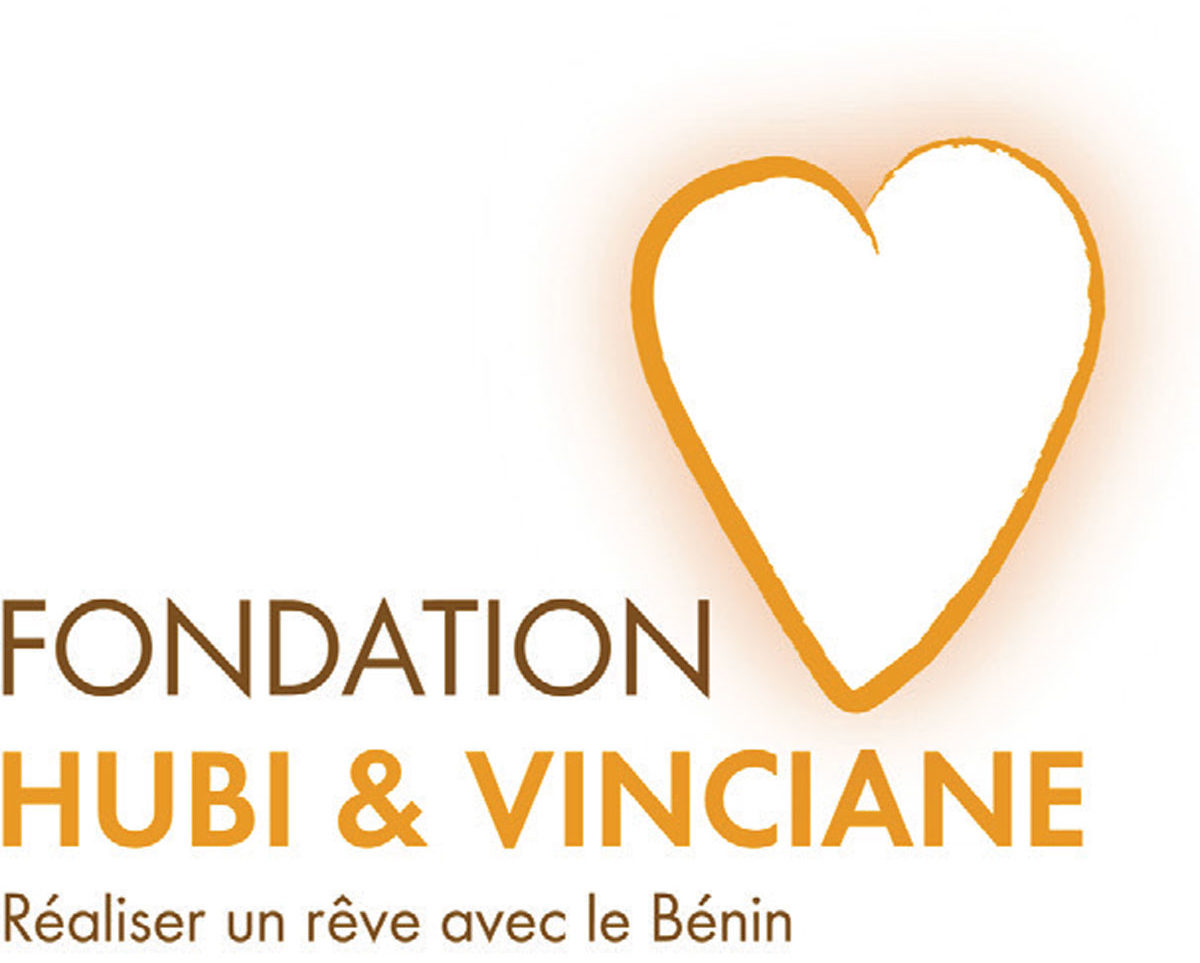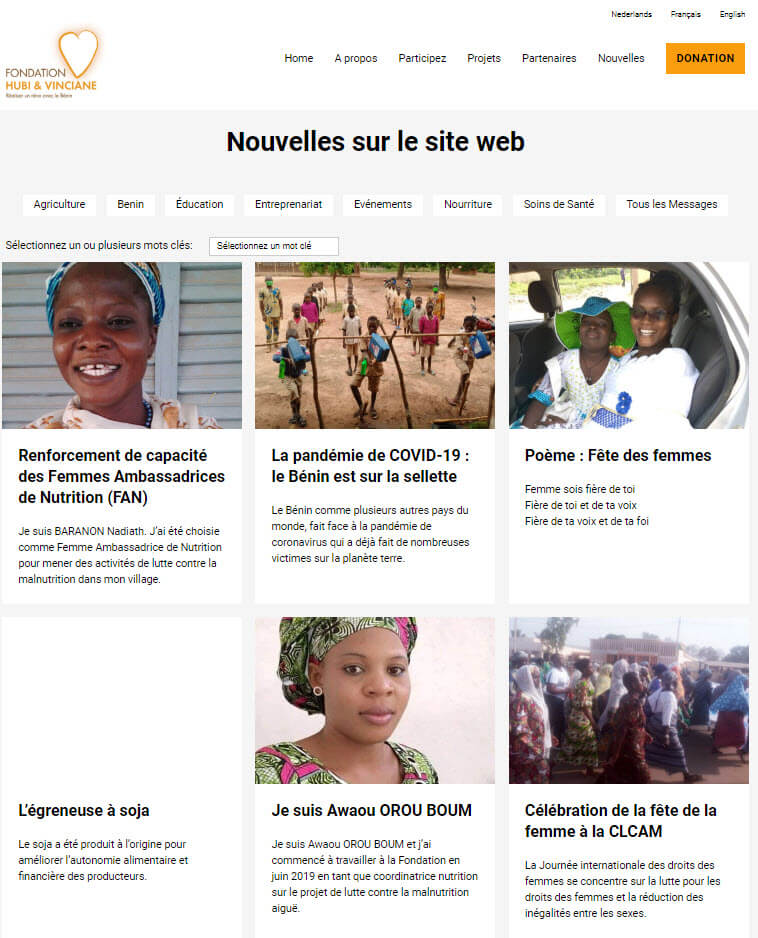N-AQUAPONICS
To Update
Introduction of the Aquaponics system in the villages of Borgou.
Aquaponics is a sustainable ecosystem for food production that combines plant cultivation and fish farming. This circular farming technique fits perfectly with the programme and with one of the three fundamental pillars of the Foundation, namely to contribute to a balanced and healthy diet through sustainable agriculture.
In its permanent search for means and methods to combat malnutrition, the Foundation has come into contact with the South African company La Pieus Aqua. This company is the only one in South Africa to fully recycle the wastewater from its fish production using aquaponics. Furthermore, the mission of La Pieus Aqua is to feed the whole of Africa with aquaponics. It has developed this modular aquaponics system to be able to produce fish and vegetables on a small surface and with low water consumption.
The Aquaponics pilot project consists of the purchase and installation of five systems, intensive theoretical and practical training in collaboration with the producer La Pieus Aqua and the control and follow-up of the daily maintenance of the systems. Two bio-engineering students have also carried out their postgraduate internship on these aquaponic systems.
On the one hand, they examined which specific vegetables from Benin grow best in these systems and compared the production with the traditional soil cultivation method.
On the other hand, local materials were also researched to build local aquaponic systems over the long term to encourage women to start their own aquaponic systems. This allows them to feed their families and sell the surplus to the rest of the community. A third marketing student also addressed the economic aspect of this agricultural system.
General Objectives
Ultimately, after evaluation of the pilot project, the Aquaponics project will make a significant contribution to the micro-economic development of 26 villages in the Borgou region. After all, an aquaponics system allows a family to obtain a healthy and balanced diet based on fish and vegetables and to sell the surplus.
Moreover, the intention is to produce the ingenious aquaponics system locally so that it can be further disseminated in the rural areas of Borgou.
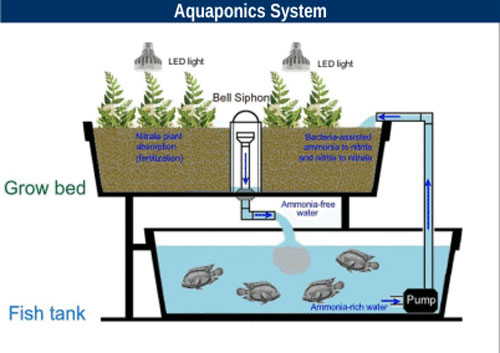
Aquaponics is a method of growing food that combines conventional aquaculture (the rearing of aquatic animals such as snails, fish and crustaceans) in a symbiotic way with hydroponics (the growing of plants in water).
In aquaculture, fish faeces end up in the water as waste (ammonium), which becomes toxic at high concentrations. This is why the water often has to be changed and why aquaculture requires high water consumption. In aquaponics, these droppings serve as nutrition and are part of the system: the ammonium is converted into nitrite by the nitrifying bacteria in the hydroponic part (« culture bed » in the diagram) and then into nitrate. Nitrate-rich water is then the ideal plant food. Finally, the purified water is recirculated to the aquarium (the « fish tank » in the diagram).
Description of the pilot project
Through education and exemplary installations in public and private places, the Foundation raises awareness of the feasibility and benefits of aquaponics as a sustainable agricultural technique.
A total of five systems were installed during the pilot project phase, one at the Foundation and the other at two of its partners :
- one at the Foundation’s new Innovation Centre, the CIAP (Centre d’Innov’Action de Parakou) ;
- two at the Sokounon farm training centre;
- two at the Faculty of Agriculture of the University of Parakou.
Between 27 October and 10 November 2019, sixteen people were trained at the Foundation’s innovation training centre. During an intensive week-long training course, they learned both how aquaponics works and how to install and maintain the systems. Besides, they were also trained as system ambassadors and then taught the rest of the community (training of trainers). In addition to the three partners, staff from the Ministry of Agriculture and a representative of a local fish farm participated in the training. The training was given by Danie Reinecke of the South African company La Pieus Aqua and the young agricultural engineer Hannah Vandewiele to sixteen local employees who became « ambassadors », able to install, maintain and manage the aquaponics system after the experts had left.
Role of the three partners :
- The Faculty of Agriculture of the University of Parakou controls the quality of fish and vegetables and launches a research program with several students. Professor Toko, who specializes in fish farming, has confirmed his cooperation and is launching a research program with several students.
- The training centre of the Sokounon Farm is responsible for monitoring the aquaponic system. It controls data on fish and vegetable production in collaboration with the producer La Pieus Aqua.
- The training of trainers took place at the Foundation’s Innovation Centre. Foundation staff, along with the other two partners, will be responsible for training the women and young people selected to work with the aquaponics system in the 26 villages.
During the pilot project phase, they are also studying how and where the aquaponics system in Benin can be produced. After all, the system from the South African company La Pieus Aqua is too expensive to be disseminated on a large scale. Some craftsmen have already been contacted to work with the Foundation for making prototypes that can be tested from 2020 onwards.
In combination with the deployment of the aquaponic system in the different villages, we will also focus on raising awareness of the importance of a balanced diet.
First results
Several vegetables were tested in the aquaponic system to evaluate their usefulness in the climatic conditions of Benin. After three months, lettuce, amaranth, onion, African eggplant, parsley, celery and leek were found to give good results.
After a few months, the fish were ready to eat. Last month, fifteen fish were harvested per system. The fish are fleshy and have a delicious taste.
Pilot Project Budget
An overview of the costs of implementing and monitoring the five systems implemented :
- Investment costs: 9,255 euros
These costs include the purchase of the five facilities and transportation from South Africa to Parakou. A solar panel was purchased to supply power to the pump. Additional solar panels will be obtained from Benin. - Start-up costs for the five systems: 1,125 euros
Start-up costs include the purchase of pebbles and seeds for vegetable cultivation, the 450 fish and the initial water quantity. - Cost of the training: 400 euros
Training costs include the fees of Hannah Vandewiele, agricultural engineer, and Danie Reinecke of the South African company La Pieus Aqua. - Monthly cost: 32 euro/month – Annual cost: 384 euro
These costs include 240 litres of water per month, 100 additional plant seeds, seven small fish per month and fish food. This project is funded by the Foundation. - Personnel costs: financed by the Foundation
Staff costs cover the costs of maintenance, harvesting and planting by community managers (2 hours/day). They are employees who are paid by the Foundation.
The total budget for the purchase and installation of five systems amounts to 11,167 euros.
Location: the villages of Borgou
Partners : Faculty of Agriculture, Sokounon Training Centre, Foundation Innovation Centre
Purchase, installation and training budget: 11 167 euros
Period : 2019
Sponsors : Salvatoriaanse Hulpactie & Ontwikkelinshulp, Lions Club Leuven Erasmus and the province of Flemish Brabant
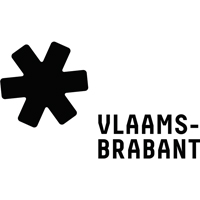

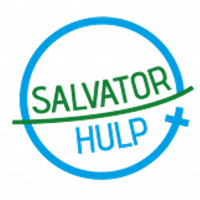
Aquaponie : production intégrale de poissons et de légumes
La Fondation a entrepris plusieurs démarches pour trouver des solutions efficaces et durables dans la lutte contre la malnutrition.
